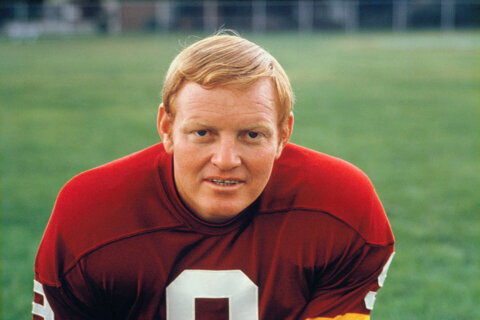WASHINGTON — One of the realities of covering and consuming the NFL (and sports in general, really) is that we’re bombarded with statistics on a week-to-week basis to help lend context to what we’re watching.
Plenty of numbers and factoids were bandied about Sunday as teams were locking up playoff spots — but few made me stop in my tracks like this one involving teams that were eliminated:
2017 will mark the first time in the Super Bowl era that the Cowboys, Giants, Redskins, Packers, and 49ers all missed the playoffs.
The last time all 5 of those teams missed the postseason was in 1964.
— NFL Research (@NFLResearch) December 25, 2017
This is obviously relevant to us locally since it involves the Redskins and two of their division rivals. But let’s look a little closer.
Those five teams have played in 29 of the league’s 51 Super Bowls and hold a 21-8 record in those championship games. To say these are among the NFL’s landmark franchises isn’t a stretch, especially when you consider Dallas is the baby of the group at the ripe young age of 57.
This year the NFC playoff bracket will have no more than a combined three Super Bowl titles between the six teams, opening the door for some new blood. That’s great for those franchises and their fans. But is it good for the league?
It’s a debate that has raged within the NFL for decades. Late commissioner Pete Rozelle is famous for his mission to ensure parity in the league, the intention being that every fan base (i.e. paying customer) has a reasonable hope that a Super Bowl could be on the way soon.
The counterargument is that dynasties are what drives interest. Compelling story lines are built around that team (or two) that competes for and wins championships on a regular basis, giving their fans the holy grail of sports while the rest of the league has that spellbinding villain to root against.
I get both sides of the coin. Dallas is a team everyone either loves or loves to hate. Damn near everyone who’s not a Redskins fan hates the franchise because of the owner and the team name. The Packers are a community-owned franchise with the most efficient (and perhaps best all-around) quarterback in the game, so they’re virtually irresistible to bandwagoners. Even if you don’t like those teams, they’re compelling and you’ll tune in to root for or against them.
But I think parity works for the NFL better than it does for the other pro sports leagues. I generally have no interest in watching a New England Patriots game because I already know the outcome: They find a way to win at the end. Most people I know feel the same way. But I’m fascinated by the Minnesota Vikings with their journeyman QB, the Seattle Seahawks’ one man band of Russell Wilson, and the doormat-to-dominant tale of the Los Angeles Rams. Those are the kinds of stories networks would love to promo to death during their two weeks of pre-Super Bowl coverage.
That said, I don’t believe it serves the NFL in the long run if the five landmark teams don’t matter for an extended period of time. MLB isn’t as fun when the Yankees and Red Sox suck for years, and the NBA suffers when the Lakers and Knicks are annual lottery teams. It’s a net loss for the NFL if big media markets like Washington, New York, Dallas, and the Bay Area are simultaneously irrelevant for more than a year or two.
The Packers and Cowboys will likely bounce back in 2018 and the 49ers have morphed into a competitive team overnight just by trading for Jimmy Garoppolo. So I really don’t see the five landmark teams missing the playoffs as anything more than an anomaly.
I see it more as an opportunity for a team like the Eagles, Vikings, or Falcons — long-suffering teams in desperate search of their first taste of championship success — to go on a deep playoff run, gather a following, and hoist a Lombardi Trophy to not only end a long title drought, but add another quality example of parity winning over predictability.
Although…you probably knew I’d push you to check out the updated NFL Week 16 Recap here, so maybe predictability isn’t all bad.








